Story highlights
Evergrande Football School in China is reportedly the world's biggest
Chinese President Xi Jinping hopes it's the future of the country's soccer team
China is ranked 96th in the world despite having world's biggest population
Rising from the early morning mist like a Disney castle sits the imposing face of what President Xi Jinping hopes is the future of Chinese football.
Evergrande Football School is front and center in the push to bring footballing glory to a nation currently languishing in the lower echelons of the sport.
China’s leader has made no secret of his love for the “beautiful game.” He’s also made it clear he wants to see China qualify for, host and one day win, the World Cup.
And in China, what Xi says, Xi usually gets.

Big spenders
Billions of dollars have been ploughed into the Chinese game in recent years, most notably in the form of high-profile marquee signings in its professional league.
The country’s transfer record was broken four times in the space of a month during the close season, as Chinese Super League teams spent more during the winter transfer window than even their English Premier League counterparts.
The likes of Brazilian midfielders Alex Teixeira and Ramires, as well as Colombian striker Jackson Martinez, stole the headlines as they left Europe for China in big-money deals. But there’s much more going on behind the scenes.
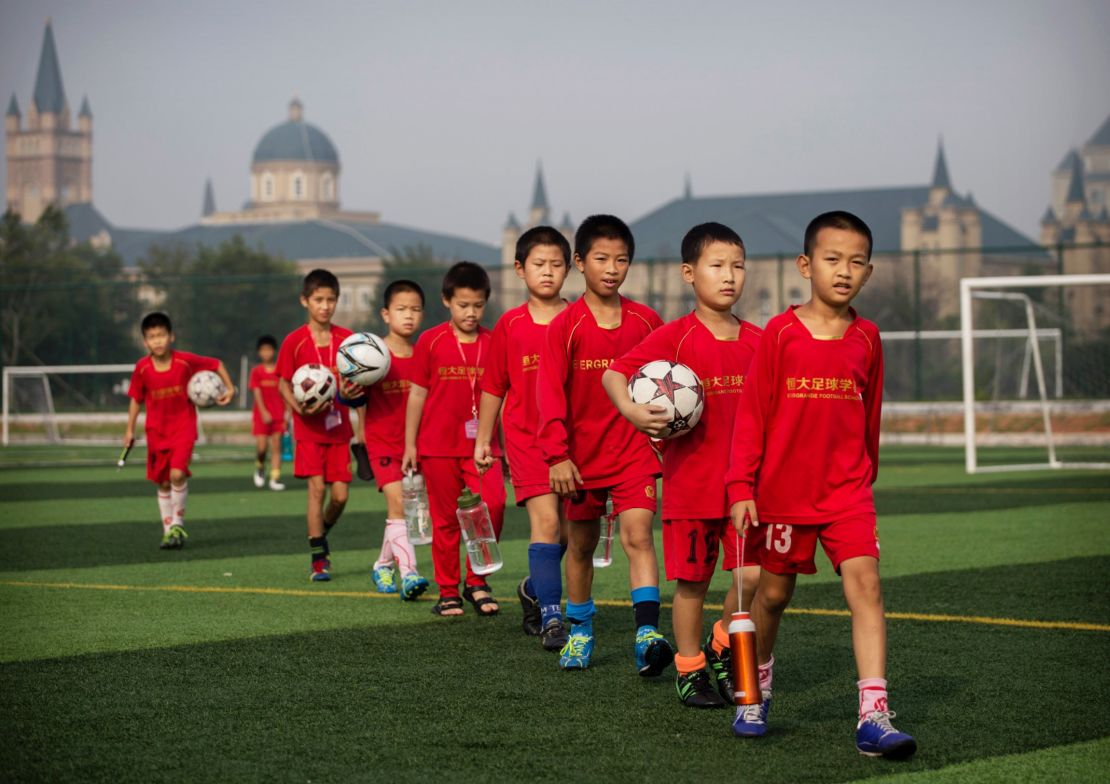
In addition to buying players, several of China’s top clubs are pumping money into the grassroots side of the game – specifically youth football.
But it isn’t purely for the love of the game. Experts say it’s all about buying favor with Xi.
“To a Chinese billionaire, a few hundred million dollars is a small price to pay,” China football-watcher Rowan Simons says.
READ MORE: Chinese president’s $300M ‘happiness plan’
On an Evergrande scale
In just 10 months, and at a cost of $185 million, real estate company Evergrande turned an area of rural southern China into the biggest football school in the world.
If all goes to plan, the kids learning to trap and pass a ball today could be the ones pulling on a first-team shirt and running out at Guangzhou Evergrande’s Tianhe Stadium in a few years.
Sitting proudly outside the front gates of the school is a 40-foot tall replica FIFA World Cup trophy – a daily reminder of the ultimate goal.
Fourteen-year-old He Xinjie left his family in neighboring Fujian province almost four years ago to chase that dream.
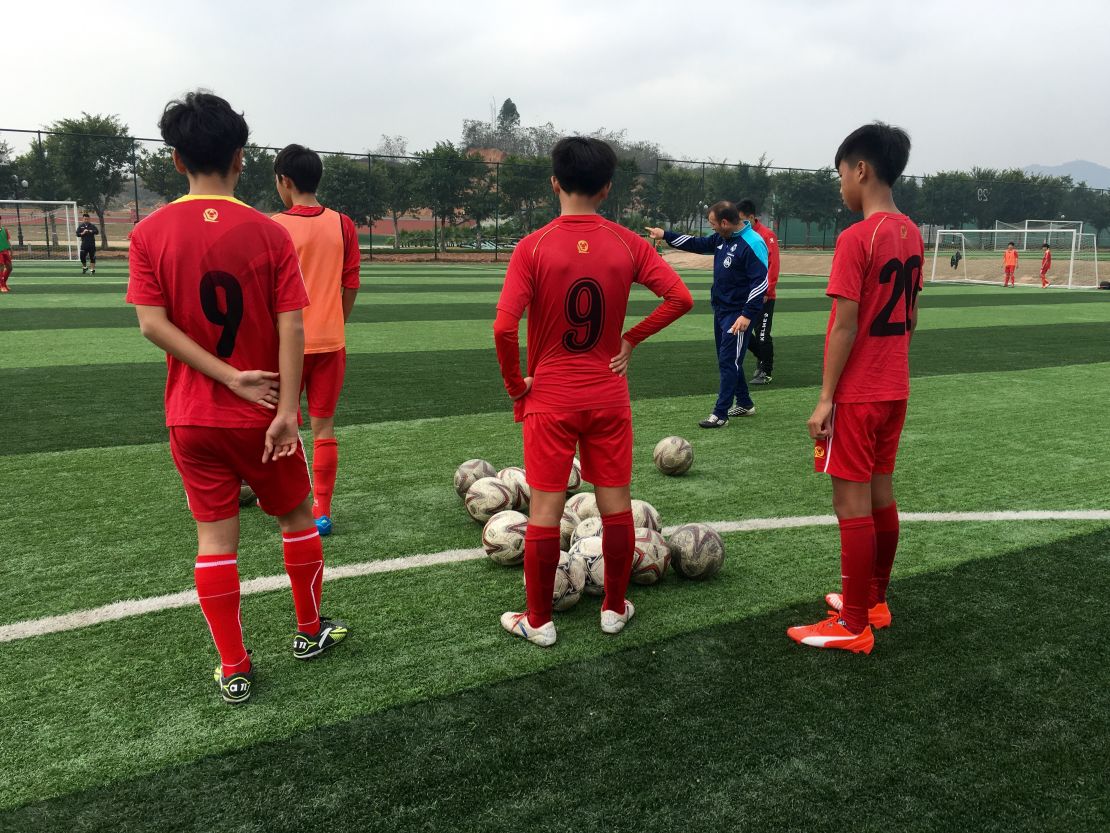
“I hope to make it into the national football team and then make it into the Spanish clubs like Barcelona and Real Madrid,” the slightly-built teen says, with a wry smile. “Or get into the national team and fight for national pride.”
He is one of China’s best players in his age group and is here on a scholarship.
Without it, he’d still be kicking a ball around the dusty streets of his hometown, he tells us. But he’s one of the fortunate ones and has already been to Spain with the school to play against some of the best Europe has to offer.
“I feel very lucky,” he says, almost embarrassed.
READ MORE: Is this the most exciting Premier League ever?
A Spanish flavor
He’s one of 2,600 boys and 200 girls from across the country – including Tibet, we’re proudly told by our guide – who live and breathe football here.
The reason behind his desire to make it to Spain’s La Liga soon becomes apparent.
Cries of “buen pase” and “gol” echo across the 50 pitches. Two dozen Spanish coaches, the result of a partnership with Real Madrid, bark out instructions – instantly translated into Chinese and repeated with added vehemence.
Unfortunately, for most if not all of the near 3,000 students here, it’s the closest they’ll ever get to playing for the European giants.
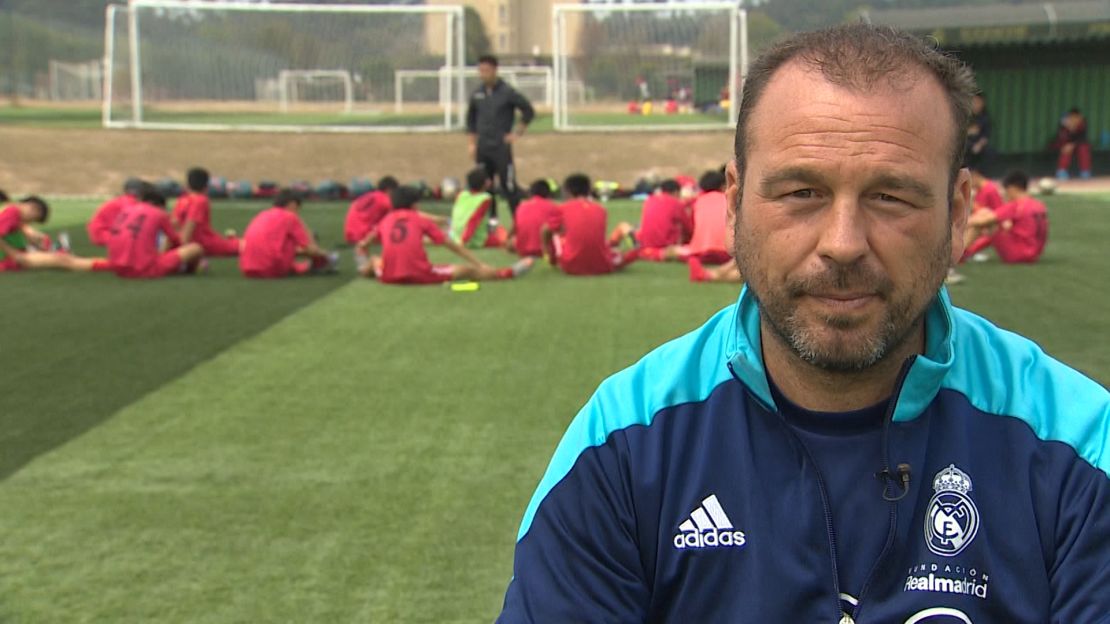
After two decades of coaching in Europe, Sergio Zarco Diaz swapped sunny Spain for a challenge in China.
In his four years here, he says the standard has improved dramatically but admits Chinese youngsters have a long way to go.
“What we notice is the children are at a high technical level but the greatest difference is tactically, particularly in the decision making process,” he explains.
A costly pursuit
China has qualified for just one World Cup – in Japan and South Korea in 2002 – but it didn’t go to plan. Team China went out in the group stage, losing all three matches without scoring a goal.
It’s a problem we saw firsthand. Plenty of huff and puff but not much end product.
Every Saturday morning all 50 pitches are in use as the school’s teams pit themselves against each other, taking a break from the week’s training and putting their skills to the test.
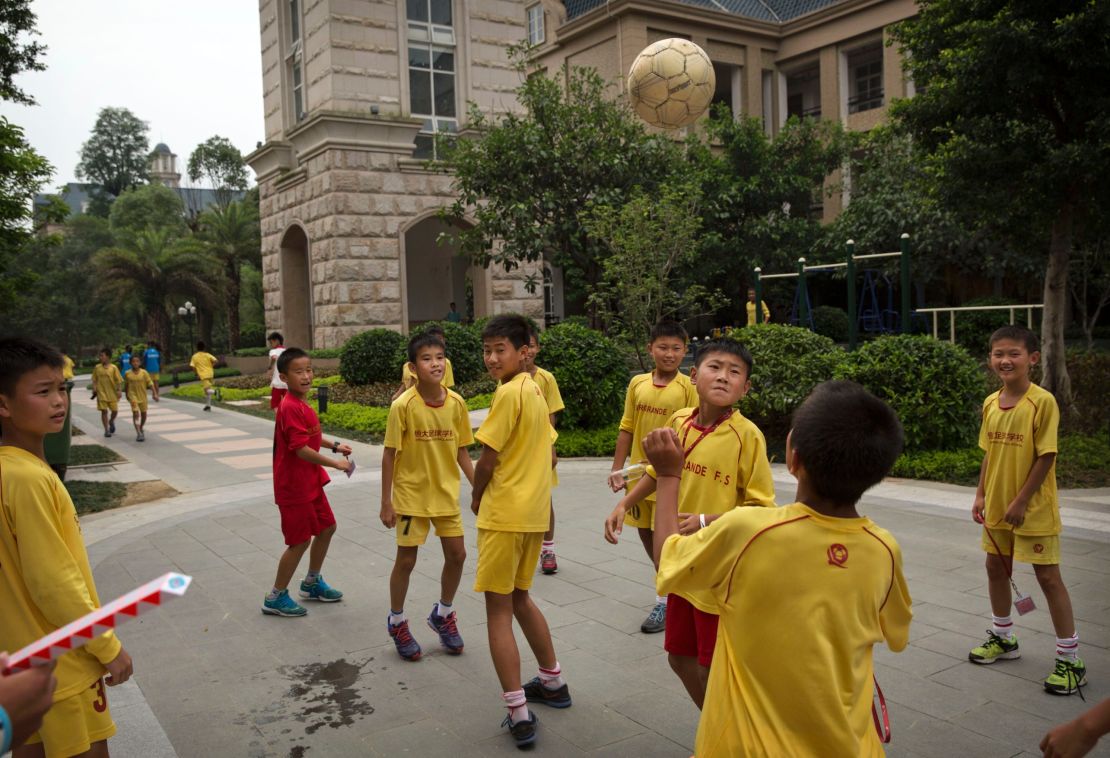
Prowling the touchline are the Spanish coaches, their translators in tow. They’re drowned out only by the shrieks of excited parents who take this weekend opportunity to see their children.
They’re paying up to 60,000 yuan ($9,200) a year to send their children here – slightly more than the average annual wage in China. Unless you’re talented enough to win a scholarship or some form of assistance, you’ve got to be wealthy to come here.
One class in five is football training, the rest of the time taken up with traditional subjects. But football is what everyone really wants to do, so even the non-football classes have a heavy slant towards the game.
“When I first came here I taught using key football terms,” says Zhang Liya, an English teacher from Beijing. “These kids come from all parts of our country and their English level is quite different. They say, ‘When I was young I just learned how to play football, but we never had lessons.’”
For Zhang and her colleagues, teaching comes first – even if it might not for their soccer-mad students.
“First we should train the kids to be a good person and how to behave,” she adds. “Then we can train them to be a footballer and maybe eventually they can be a famous football star.”
Traditionally in China team sports have been of low importance, with parents preferring to push their children into prestigious professions like law and medicine. If they did turn to sport, it would be individual events like swimming or gymnastics.
Investing China style
But times are changing. And football is emerging.
The investment here is on a scale you’d only see in China. The 50 pitches are spread over more than 160 acres. They sit alongside basketball, tennis and volleyball courts, a swimming pool and movie theater, as well as a gym, library and several canteens. Special chefs have been flown in from the western Xinjiang province to cater for the dietary requirements of the region’s Muslim players.
Linking it all together are tree-lined avenues, imposing street lamps and grand European-style piazzas.
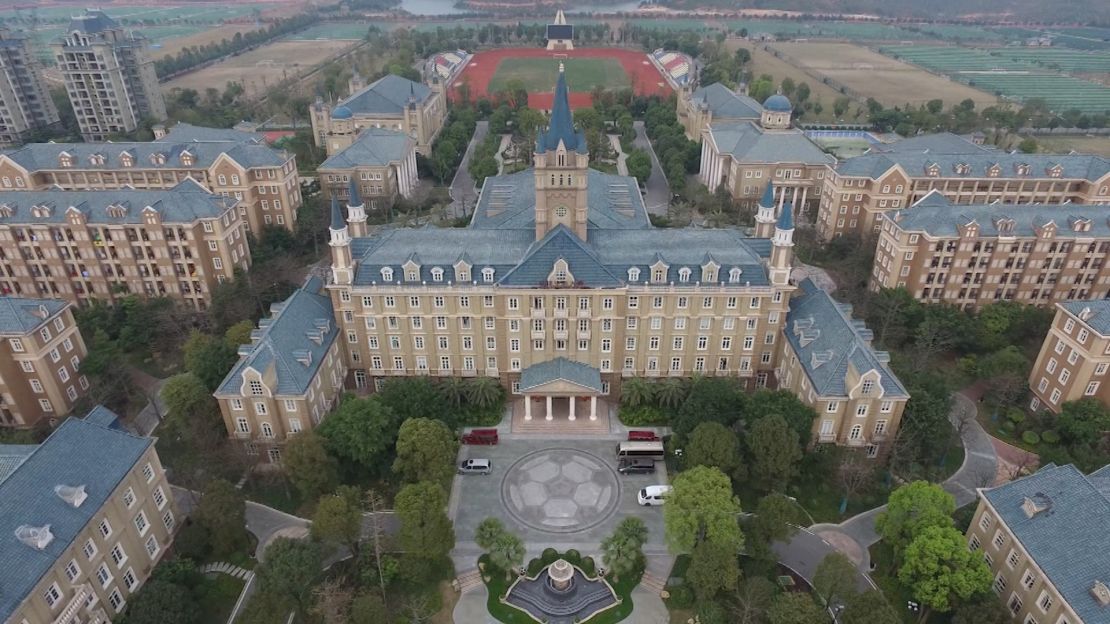
The manicured lawns and more than $30 million worth of Southeast Asian trees, we’re told, are all just a few hundred yards from barren vegetable patches, wooden shacks and potholed roads. At the heart of the campus is the centerpiece Football Center Building – a huge Hogwarts-style mansion, complete with clock towers and spires.
It’s a stark reminder of China’s wealth divide, and a not-so-subtle reminder of the money the country is throwing at its footballing problem.
China is ranked 96, below minnows like Faroe Islands and Guatemala.
The man who oversees things here at the school, Principal Liu Jiangnan, tells us there’s definitely room for improvement.
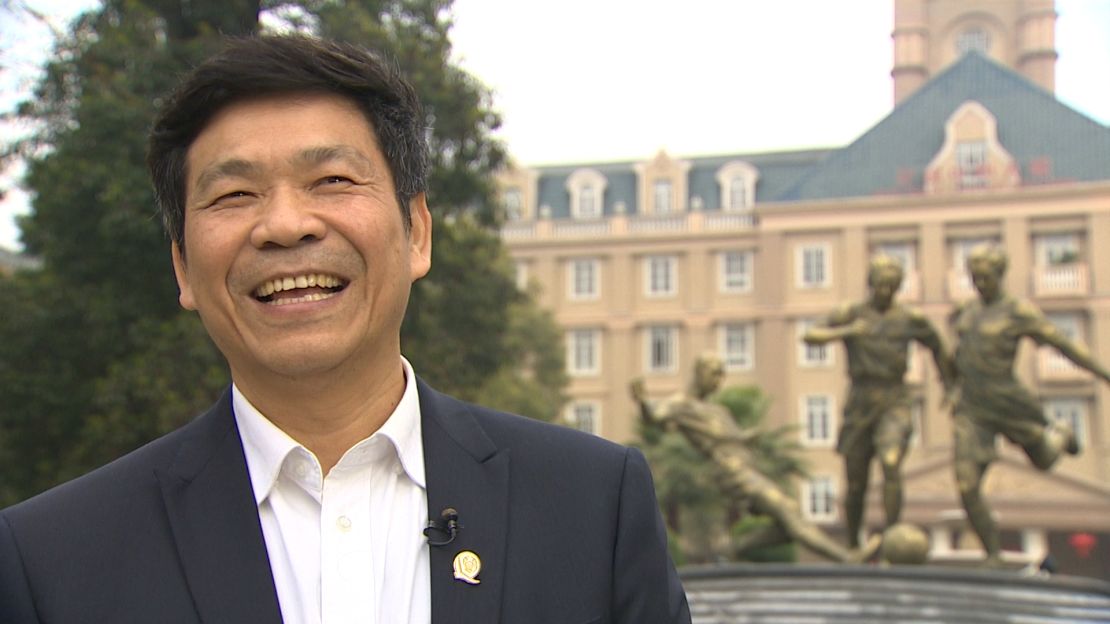
“This ranking is incongruous with China’s international standing as a world power,” he says.
“In about four years, Chinese football will definitely see an improvement and maybe return to be one of the top contenders in Asia.
“And of course, in about 20 or 30 years we will set our sights on the top world rankings.”
With the money flowing into Chinese football at the moment, you wouldn’t bet against them.
Can China become a soccer superpower? Have your say on CNN FC’s Facebook page










